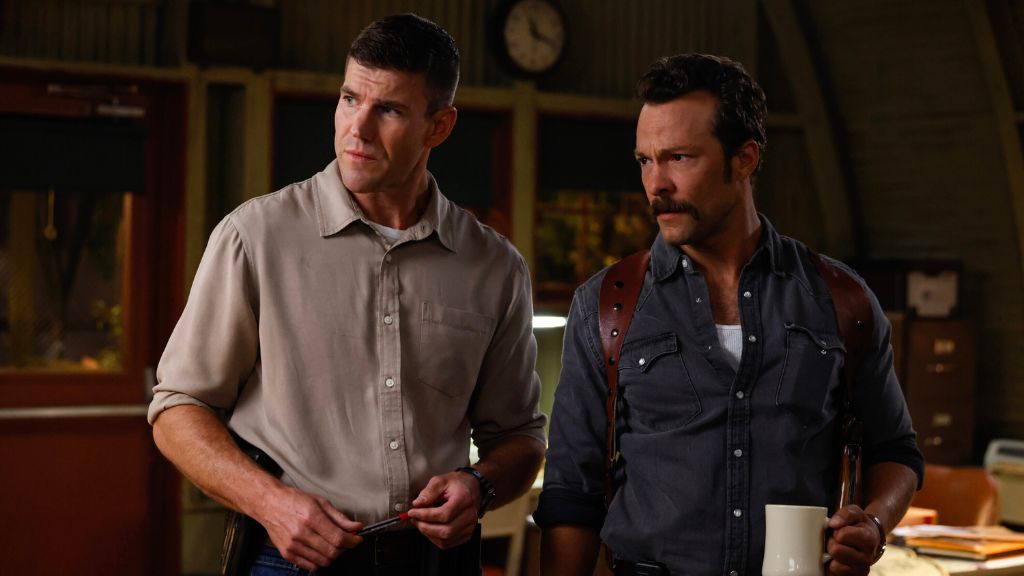In terms of TV longevity, NCIS and Law & Order lead the way.
Not only are these shows popular, they are institutions.
They’ve withstood industry changes, the rise of streaming, and even the fickle tastes of audiences, proving that some formulas are indeed timeless.


While most TV shows struggle to survive a few seasons, these crime dramas remain untouchable.
But what exactly keeps them at the top? Let’s explore why these TV giants refuse to go away.
A formula that stands the test of time
The secret to these shows’ success is their rock-solid formula.
“Law & Order,” which debuted in 1990, used a groundbreaking structure that divided each episode into two halves – one focused on police solving crimes and the other on the lawyers prosecuting them.


This formula is so simple and effective that it feels timeless from the start. You don’t need to follow ongoing character arcs or remember what happened last week.
You can dive into any plot and instantly know where you stand. The real star is the justice system, with New York City serving as a gritty, ever-present backdrop.
However, after 20 seasons, “Law & Order” went off the air in 2010.
But in 2022, it makes a triumphant return, seamlessly blending familiar faces like Jack McCoy with a new generation of characters.
This revival is a testament to the show’s staying power and ability to adapt to modern audiences while staying true to its roots.
Meanwhile, “NCIS,” which premiered in 2003 as a spin-off of “JAG,” brought a slightly different energy to the procedural genre. Its cases are military-focused, but the real appeal is its team dynamic.


Gibbs’ leadership, Abby’s eccentric talents, and the camaraderie between the agents make this more than just a crime show—it feels like a family.
Fans don’t just care about these mysteries; They appear for humor, sincerity, and a sense of belonging that binds the characters together.
What both shows have in common is their consistency.
They deliver satisfying, self-contained stories with resolutions at the end of each hour. It’s comforting to know that no matter how chaotic the world gets, justice will be served on television screens.
It’s this reliability that keeps viewers coming back season after season.


A character that evolves without losing its essence
While Law & Order is more focused on systems than individuals, it still manages to create some memorable characters. There’s a reason Jack McCoy, Olivia Benson, and Elliot Stabler are household names.
The show’s ability to rotate its cast without losing momentum is part of its genius.
There are no overly dramatic exits or lengthy farewell arcs – it’s all about the cases, and they remain the true stars of the show. These characters serve the justice system, not the other way around.
NCIS, on the other hand, thrives on character-driven storytelling.


Gibbs, Abby, Ducky and Tony become more than just investigators, they become part of the audience’s family.
Fans follow their journey, celebrate their wins and grieve their losses. Even as cast members leave and new people join, the show still maintains its core.
Alden Parker serves as team leader and brings a fresh perspective.
Rather than trying to emulate Gibbs, Parker created his own leadership style, blending dry wit with a more collaborative approach. It proves that the show can evolve without losing its uniqueness.


Reinvention through derivatives
Another reason for the longevity of these shows is their ability to reinvent themselves through spin-offs.
“Law & Order: SVU” leads the “Law & Order” trend by taking a more emotional approach by focusing on sensitive cases.
At the heart of the show is Olivia Benson, played by Mariska Hargitay, who has become one of the most iconic characters in television.
Benson is not just a detective; She is a symbol of resilience and justice, tackling some of the most challenging storylines on television with empathy and strength.
Her leadership and compassion earned her a legacy far beyond the confines of the show, making her one of the most recognizable and respected faces in television history.


As creator Dick Wolf said in celebrating the show’s 21st season, “She’s the spark plug, the leader and the voice of the show.”
SVU is now the longest-running primetime live-action series, and Benson’s impact on audiences and the genre itself is undeniable.
Meanwhile, other spinoffs, such as Law & Order: Organized Crime , give viewers an inside look at the criminal mind.
Law & Order: Organized Crime, in particular, brought Elliott Stabler back to the mainstream, exploring the interconnected world of organized crime in a serialized format.
This darker, more layered storytelling gives the series a new edge, proving its adaptability without losing sight of what makes it great.


Even short-lived shows like “Law & Order: Trial by Jury” and “Law & Order: Criminal Intent” showcased the series’ ability to experiment with formats, proving its flexibility as a storytelling powerhouse.
Not every spinoff becomes a cultural phenomenon, but each one adds something unique to the “Law & Order” legacy.
Meanwhile, NCIS has had a series of successful spin-offs, each of which has brought a unique flavor to the series.
From the action-packed cases of “NCIS: Los Angeles,” to the soulful charm of “NCIS: New Orleans” and the tropical atmosphere of “NCIS: Hawaii,” these series are presented in a series that stays true to its roots. At the same time, it expands the world of “NCIS.”
Recent additions, such as NCIS: Origins, have also deepened the series’ storytelling.
This prequel explores the early career of Leroy Jethro Gibbs, exploring the events that made him a fan-favorite leader.


And the series doesn’t stop there – fans are already buzzing about the upcoming NCIS: Tony & Ziva , which promises to revisit two of the show’s most beloved characters to help them succeed A fresh start in life after leaving the original series.
Spin-offs not only keep these franchises alive, they also prove that their formulas work in any setting.
Whether it’s the gritty streets of New York or the beaches of Hawaii, these shows can be adapted without losing their magic.
Familiarity is a kind of power
Their predictability makes these shows unstoppable – and yes, that’s a compliment.
Watching NCIS or Law & Order is like meeting an old friend.


You know what’s going to happen next: a body will fall, an investigation will begin, and justice will be served by the end of the hour. In a world that often feels chaotic, this reliable structure is a gift.
CBS Entertainment President Amy Reisenbach summed it up perfectly in an interview with The New York Times, calling NCIS “comfort food with a side of murder.”
It’s this perfect combination of reliability and appeal that keeps viewers coming back season after season, proving that sometimes sticking to a formula really does work.
Both shows manage to stay relevant without straying too far from their roots.
Whether “NCIS” tackles topics like cybersecurity or “Law & Order” tackles cases inspired by headlines, they evolve with the times while retaining the elements that make them timeless.
At the end of the day, “NCIS” and “Law & Order” aren’t just TV shows, they’re part of the cultural fabric.


They create familiar worlds, characters that feel like family, and stories that keep us immersed week after week.
They prove that sometimes, the best TV isn’t about flashy gimmicks or constant reinvention – it’s about sticking to what works.
And you? Are you an NCIS team or a Law & Order team? Do you have a favorite spin-off?
Have you already started exploring NCIS: Origins, or are you excited for the upcoming NCIS: Tony & Ziva?
Let us know what keeps you tuned in – because these shows are clearly not going anywhere!

